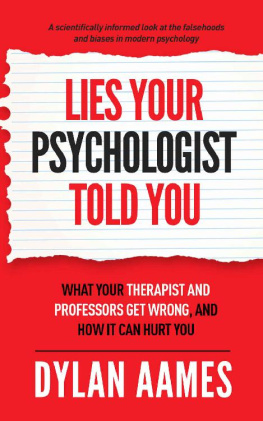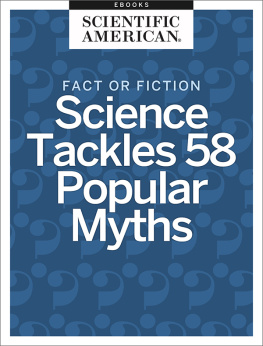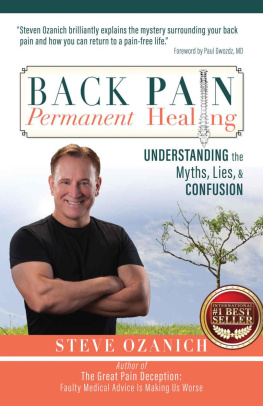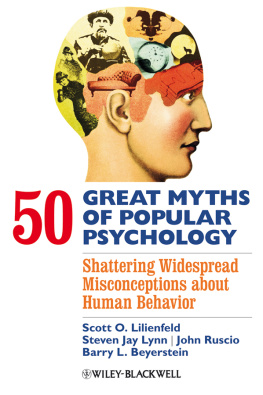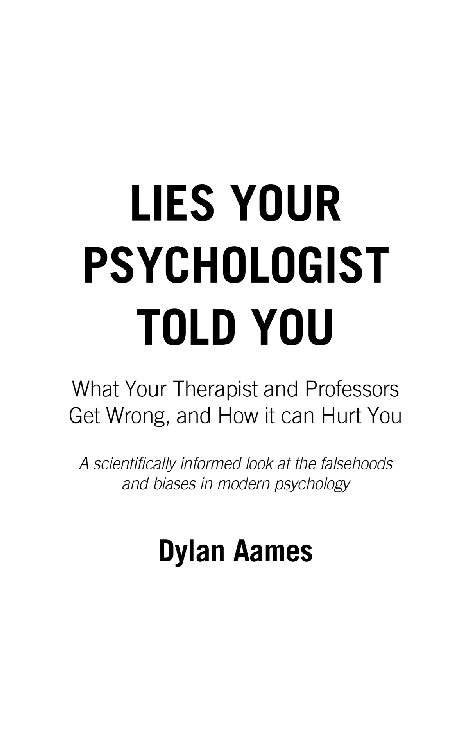
Copyright 2020 Dylan Aames
All rights reserved.
AmericanAim Publishing, LLC
In memory of Dr.James Daley, my first and most influential psychology professor
The information in this book is not a substitute forthe advice of a professional. Consult a clinician before stopping, changing, orstarting any medication or therapeutic treatment. The author and publisherdisclaim any liability from the use or misuse of the information containedwithin this book.
ACKNOWLEDGMENTS
I am very thankfulfor the psychologists, psychiatrists, and other professors who correspondedwith me during the research for this book, including Noam Chomsky, MartinSeligman, Irving Kirsch, Walter Brown, Scott Lilienfeld, Paul Bloom, GunnarNewquist, Chris Ferguson, and David Myers. I would also like to thank DaleCucchiaro for lending his editing skills.
CONTENTS
INTRODUCTION
Most womensmoods worsen during premenstrual periods.
Childrenprenatally exposed to crack cocaine develop severe psychological problems.
Schizophrenicshave multiple personalities.
Women havebetter social intuition than men.
Human memory islike a recording of what happened.
You only use 10percent of your brain
Yourelikely familiar with all of these claims, and you probably accept each one astrue. Yet, psychological research demonstrates that each of these claims is, infact, false. Some psychologists, including the authors of the excellent book, 50Great Myths of Popular Psychology, have attempted to educate the publicabout these and other widespread misconceptions.
Psychologiststhemselves, however, are not immune from believing in false psychologicalclaims. In fact, research shows they often have mistaken beliefs about manydifferent topics in their field, which they pass on to students and patients.This book is about those myths or lies. Examples include:
- Stereotypes are largely inaccurate;
- Hypnosis is a special trance state thatdiffers from wakefulness;
- There are indicators a person is lying;
- Its better to express anger than to hold it in;
- Babies learn language;
- Depression is caused by a chemical imbalance inthe brain;
- Psychopaths are untreatable;
- Brainwashing exists.
Each of thoseclaims is either unsupported by evidence or has been falsified throughresearch. Unfortunately, too many psychologists have been slow to catch up withcurrent findings and are still propagating many of these myths. Itsunderstandable since psychology is a large and complex field. Nevertheless, weshould try to correct our mistaken beliefs.
There is yetanother type of lie, which is included in several popular introductorypsychology textbooks. It involves presenting one-sided information that servesto mislead the reader into believing the research is more established andconclusive than it actually is. Some examples of these biased claims include:
- Playing violent video games increasesaggression;
- Children who are spanked are more likely todevelop behavioral problems;
- There are multiple intelligences, such as socialand emotional IQ;
- The reason men generally outperform women onmath tests is because women have been conditioned to believe they are worse atmath.
Each of thoseclaims is highly controversial. Yet, analyses of many textbooks show that onlyone side of the argument is often presented to the reader. This book presentsthe other side.
Lies Your Psychologist Told You is about you,the reader. Psychology is a personal subject, and part of its intrigue lies inits relevance to our own lives. Each chapter covers a different lie that istold by both psychotherapists and psychology professors, and in some cases,psychiatrists - and is often accepted by the public as fact. By lie, I mean afalse or misleading claim. Of course, I dont mean they intend todeceive students or patients; just that the effect is to deceive. This bookaims to correct the deception and reinvigorate the readers interest instudying the most fascinating topic of all: ourselves.
PART I
OVERVIEW OFSCANDALS, LIES, AND BIASES IN CONTEMPORARY PSYCHOLOGY
ARE MOST PSYCHOLOGYFINDINGS WRONG?
All 85 pages ofHarvards report were stamped, CONFIDENTIAL. Administration officials clearlydidnt want any part of the document leaked to the press. In 2007, a few yearsbefore they filed their secret report, Harvard authorities raided the lab ofone of their more popular and prominent psychology professors. While the starprofessor was out of the country, they entered the 10th floor of the historicWilliam James Hall and seized his computer equipment, video tapes, notes,personal emails, and financial documents. Something had to be done before the departments reputation - eventhe entire field - would be under attack. No, this was not a sexual misconductcase; this was an academic scandal of epic proportions.
And it would not be the only psychologydepartment in crisis mode. This was just the beginning.
Priming
In 2011, the sameyear as the Harvard report, several high-profile studies conducted by John Bargh,a Yale University psychologist, were being questioned. Bargh is well-known forhis research on priming, which involves exposing individuals to astimulus that influences their later behavior without their awareness thestimulus had any effect on them. Millions of people have become familiar withthe priming effect after Malcolm Gladwell popularized the concept in hisbest-selling book, Blink. But it all started with a 1996 study that is now considered aclassic in psychology.
The experiment involved asking one group ofstudents to form sentences from a list of random words. Another group was givenwords that elicited thoughts of old age, such as bingo Florida bitter,wrinkles, and alone. However, unbeknownst to the participants, the real experimenthadnt yet begun. After both groups finished putting their words intosentences, the students were told the study was over and they were free toleave. Outside the lab, a spy secretly timed how long it took them to walkthrough the hallway. It turned out the participants who had rearranged theelderly words walked slower than the group who rearranged words with notheme. Barghs elderly-walking study became highly influential, demonstratingthat subtle cues beyond our control can influence our behaviors aquasi-challenge to free will itself.
Another one of Barghs priming studiesdemonstrated something equally extraordinary. In the elevator on the way to thelab, a research member would casually ask participants to hold her drink for amoment. The research member would then write down some things for about 30seconds and then take the drink back. Half the participants were asked to holda warm cup of coffee, and half were asked to hold an iced coffee; those werethe only two differences between the groups. The participants, of course, wereunaware that holding the drink had anything to do with the study.
When they got to the lab, the participants allread the same short description of a person. They were each then asked tocomplete a questionnaire, rating the individual on a variety of personalitytraits. The participants who were handed warm coffee were more likely to ratethe person as warm, social or pleasant, compared to those who were handediced coffee. Based on this research, Bargh offers some practical advice:important decisions should be made while holding a cold drink since coldnessactivates the part of the brain associated with caution. And if you want tomake a good first impression on your girlfriends parents, offer them a warmdrink in front of a roaring fire.
Next page
